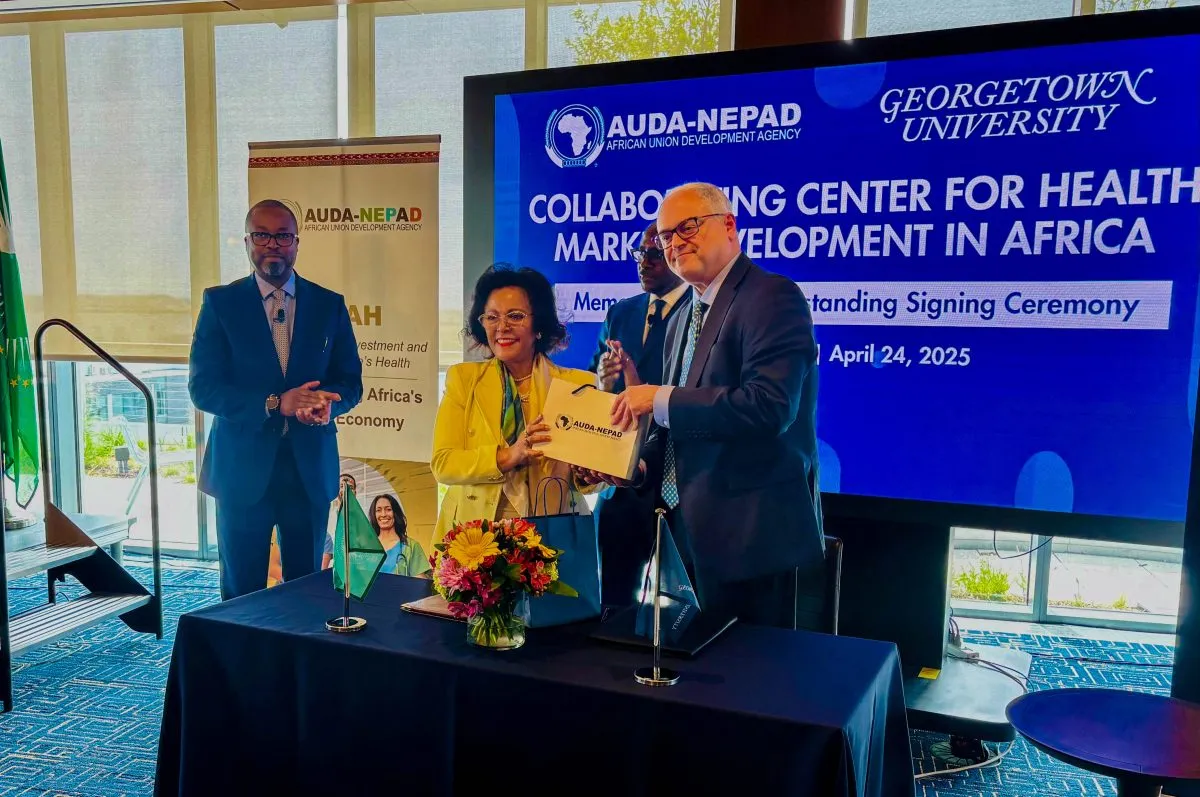In a decisive move to reshape the continent’s health financing landscape, the African Union Development Agency-NEPAD (AUDA-NEPAD) and Georgetown University have officially launched the Collaborating Centre for Health Market Development. This groundbreaking platform, the first of its kind, seeks to unlock the potential of Africa’s health economy through strategic investment, innovation, and greater policy coherence.
The launch event, held in Washington, D.C., brought together an impressive array of government leaders, global health actors, private sector executives, philanthropists, and development finance institutions. Their presence signalled a new era of delivery-focused collaboration, one aimed at strengthening health systems, expanding access to services, and fostering economic resilience across Africa.
Speaking at the launch, Ms Nardos Bekele-Thomas, Chief Executive Officer of AUDA-NEPAD, underscored both the urgency and the immense opportunity embodied in this initiative. “Africa’s health sector is not just a site of service delivery—it is a driver of economic transformation,” she declared, setting the tone for the discussions that followed.
Dr Donald Kaberuka, Former President of the African Development Bank and current Chair of the Global Fund Board, echoed these sentiments. He acknowledged that while Africa has witnessed pockets of progress in health development, there is an urgent need to scale up efforts. He stressed that the success of this endeavour depends on partnerships grounded firmly in African agency while welcoming robust global collaboration.
The new Centre has been conceived as an agile, cross-sectoral platform designed to drive systemic change. Its work will focus on bringing private capital into health projects by structuring investments and developing project pipelines. It will provide technical support to Ministries of Health and Finance, helping them to integrate health more effectively into national planning and fiscal frameworks. Another key focus area is improving market efficiency through regulatory alignment and pooled procurement strategies. Furthermore, the Centre will serve as a showcase for African innovation in fields such as health diagnostics, digital platforms, and local manufacturing.
Representing the Corporate Council on Africa, a major supporting partner of the Centre, Florie Liser, President and CEO of the organisation, highlighted the broader ambitions underpinning the initiative. She described the Centre as “more than just a new initiative—it is a dynamic engine designed to shape policy, drive investment, accelerate innovation, and ultimately strengthen Africa’s health systems.”
Liser reaffirmed the Corporate Council’s commitment to ensuring that private sector leadership remains central to the Centre’s work, in alignment with the principles of the U.S.-Africa Health Security and Resilience Initiative. Her remarks highlighted a crucial element of the Centre’s vision: that sustainable progress in Africa’s health sector requires the full and active participation of private actors alongside governments and development partners.
The initiative is anchored around the Programme for Investment and Financing in Africa’s Health Sector (PIFAH). Drawing on lessons learned from successful infrastructure models such as the Programme for Infrastructure Development in Africa (PIDA), PIFAH seeks to build a new ecosystem of investable, high-impact health interventions. It is aligned with the broader ambitions of Agenda 2063, the African Union’s strategic framework for the socio-economic transformation of the continent.
In a stirring address to delegates, His Excellency President Olusegun Obasanjo, former President of Nigeria and African Union High Representative, spoke of the fundamental role that governments must play in this journey. He noted that creating the right enabling ecosystem is vital for Africa’s health sector to thrive. In posing a challenging question—”Does health create wealth, or does wealth create health?”—he urged attendees to rethink the traditional distinctions between economic policy and health sector priorities.
President Obasanjo’s words left a profound impact on the room. His provocation served as a reminder that the relationship between health and economic prosperity is symbiotic; neither can advance sustainably without the other. His call to action challenged policymakers, investors, and health leaders to reframe their understanding of health not merely as a cost, but as a crucial investment in human capital and economic growth.
One speaker captured this shift in thinking succinctly, remarking, “This is about shifting health from the expenditure column to the investment column. And doing so with African vision, on African terms.”
The significance of the Collaborating Centre for Health Market Development extends far beyond the launch event. Its establishment represents a major opportunity to reimagine Africa’s health markets not as fragmented, underfunded systems, but as dynamic engines of growth and innovation. By focusing on investment structuring, regulatory reform, and showcasing African ingenuity, the Centre aims to catalyse a shift towards sustainable, home-grown solutions.
Importantly, the Centre is determined to work closely with national governments, recognising that political will and strong governance structures are essential for success. By supporting Ministries of Health and Finance with technical expertise and policy tools, the Centre hopes to embed health financing into national development strategies, ensuring that health is recognised as a foundational pillar of economic progress.
Moreover, by advancing regulatory alignment across countries and promoting pooled procurement practices, the Centre seeks to create more efficient and predictable health markets. This, in turn, will make it easier for investors and innovators to engage, scale up, and deliver impact at the continental level.
In showcasing African-led innovation—from digital health platforms that improve patient access and data management, to the growth of local pharmaceutical manufacturing—the Centre aims to shine a spotlight on Africa’s existing strengths. By celebrating and scaling these home-grown solutions, it seeks to break the long-standing dependency on external models and forge a new path forward.
The launch of the Centre also signals a new willingness among Africa’s development partners to take a backseat role, empowering African institutions to set the agenda, define priorities, and lead implementation. It is a bold and necessary shift, one that reflects growing recognition that sustainable health systems must be built in Africa, by Africans, and for Africans.
As Africa continues its journey towards achieving the aspirations of Agenda 2063, the creation of platforms like the Collaborating Centre for Health Market Development will be critical. By marrying investment and innovation with policy coherence and strong political leadership, the Centre promises to usher in a new era for Africa’s health economy—one where health is not seen as a burden, but as a cornerstone of prosperity.
The collaboration between AUDA-NEPAD and Georgetown University thus marks not only the birth of a new institution but the beginning of a transformative movement. A movement that reimagines Africa’s health sector as a key driver of growth, resilience, and shared prosperity for generations to come.
Want to continue reading? Subscribe today.
You've read all your free articles for this month! Subscribe now to enjoy full access to our content.
Digital Monthly
£8.00 / month
Receive full unlimited access to our articles, opinions, podcasts and more.
Digital Yearly
£70.00 / year
Our best value offer - save £26 and gain access to all of our digital content for an entire year!

 Sign in with Google
Sign in with Google 



